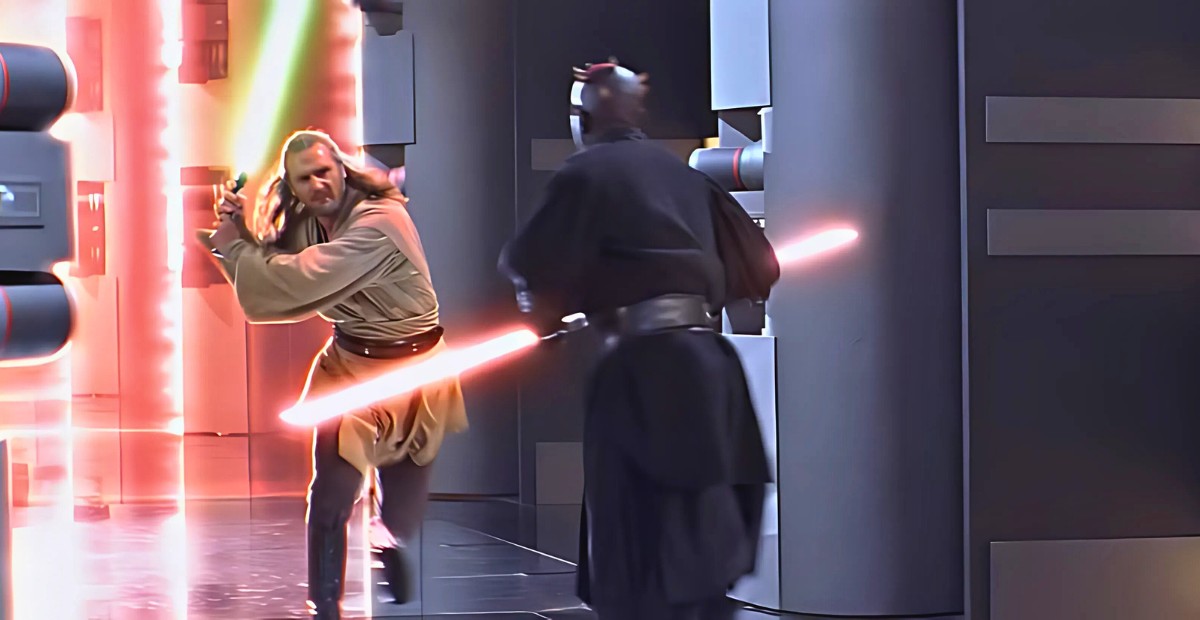When we think about the epic duel in The Phantom Menace, the one that ended with Qui-Gon Jinn’s tragic death, it’s hard not to wonder why Qui-Gon didn’t just fall back toward Obi-Wan instead of continuing to press Darth Maul.
It might seem like retreating could’ve allowed them to regroup and take Maul down together, but there are some key reasons why Qui-Gon made the choices he did.
Let’s break it down.
1. Qui-Gon’s Aggressive Fighting Style
First, we have to talk about Qui-Gon’s lightsaber form. Qui-Gon used Ataru, an offensive style focused on acrobatics, speed, and keeping the pressure on the opponent.
Ataru isn’t a defensive form – it’s all about going full throttle, attacking relentlessly, and ending fights quickly. The more you press your enemy, the less chance they have to counter or escape.
Now, if Qui-Gon had backed off and waited for Obi-Wan to catch up, he would’ve given Darth Maul the chance to regroup and go on the offensive himself.
That’s the last thing Qui-Gon wanted. In a confined area like that, where retreating meant possibly putting a laser wall or tight space at his back, Qui-Gon figured the best defense was to keep Maul on the defensive.
It wasn’t just a tactical decision; it was also a reflection of the form he had mastered.
Maul’s Plan to Tire Him Out
Darth Maul, however, was no fool. While Qui-Gon’s Ataru style worked great in open spaces with lots of room for movement, it also had a big downside, it’s exhausting.
Maul knew this, and instead of getting overwhelmed, he played a long game. Maul intentionally led Qui-Gon into a smaller, tighter area where Qui-Gon couldn’t fully use his acrobatic attacks.
By limiting his space, Maul forced Qui-Gon to exert more energy while limiting the effectiveness of his own form.
And let’s not forget, Qui-Gon was already tired. He had fought Maul once before on Tatooine and had been dealing with the chaos on Naboo.
The man hadn’t had much rest. So, when Maul led him into that confined area, it was a calculated move.
Maul was just waiting for the moment when Qui-Gon would tire out enough to make a mistake, and unfortunately, he did.
2. Protecting Obi-Wan
Another huge factor in Qui-Gon’s decision not to retreat is Obi-Wan. At that point in the fight, Obi-Wan had already been kicked to a lower platform, essentially taken out of the duel.
Qui-Gon probably realized that having Obi-Wan back in the fight wouldn’t necessarily help.
In fact, staying close to Obi-Wan might have made things worse, as Qui-Gon would’ve had to split his focus between fighting Maul and protecting his Padawan.
And yes, Obi-Wan was still just his Padawan that time, not even a Jedi Knight.
Qui-Gon was a mentor, and he had a deep sense of responsibility for Obi-Wan’s safety. If he had drawn Maul back toward Obi-Wan, he risked putting his Padawan in more danger.
Qui-Gon likely thought he had a better chance facing Maul alone, without having to worry about Obi-Wan’s safety. It was a gamble, but one based on his instinct as a protector.
3. Following the Will of the Force
We can’t ignore Qui-Gon’s deep connection to the Living Force. Just before the final part of the duel, we see Qui-Gon take a moment to meditate.
This wasn’t just a break to catch his breath, he was centering himself, trusting in the Force to guide him through this critical moment.
Qui-Gon often acted on what the Force told him, even if it wasn’t the most obvious choice at the time.
In his meditation, Qui-Gon might have felt that the only way to neutralize Maul, and protect Obi-Wan and Anakin, was to continue the fight, even if it meant taking the risk of going one-on-one with a dangerous Sith.
Qui-Gon likely believed that the Force was leading him to confront Maul head-on. He knew the stakes were high, and perhaps he sensed that he wouldn’t survive, but he pressed forward anyway because he believed it was necessary.
Even though Qui-Gon’s choice ultimately led to his death, it set the stage for Obi-Wan to defeat Maul and take on Anakin as his apprentice.
In a way, Qui-Gon’s actions fulfilled a greater purpose within the Force, allowing the story to unfold the way it did.
Final Thoughts
Qui-Gon’s decision to keep pushing Maul, rather than retreating toward Obi-Wan, was the result of his fighting style, Maul’s cunning strategy, his protective instincts toward Obi-Wan, and his deep connection to the Force.
While it might seem like a tactical misstep in hindsight, everything Qui-Gon did aligned with his character and the situation he faced.
Sometimes, in Star Wars, the bigger picture is revealed after the fact, and Qui-Gon’s sacrifice was one of those moments.
He didn’t win the fight, but his choices made sure the right things happened afterward. And in the end, that’s what mattered most.

